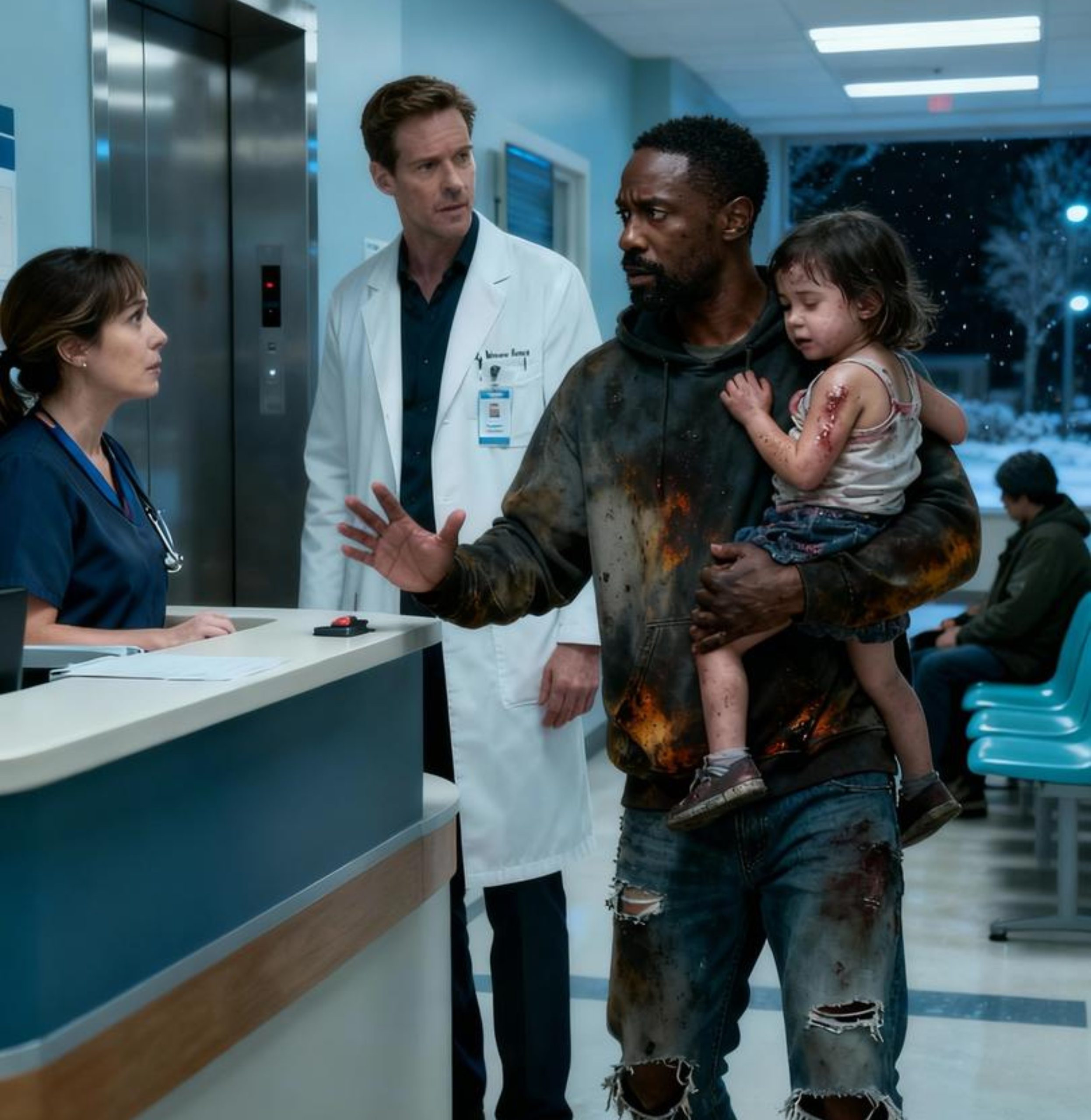The smell of antiseptic filled the emergency ward, sharp enough to sting my nose. The lights were harsh, the seats unforgiving, and the air heavy with waiting.

My little girl, Aria, lay in my arms—her skin hot and clammy, her tiny chest rising unevenly. I’d run straight here from my shift at the auto shop, still wearing my oil-stained hoodie and torn jeans.
My hands trembled as I pressed the elevator button, silently praying she would be okay.
At the reception desk, I tried to steady my voice.
“Please, my daughter can’t breathe properly. She needs a doctor.”
The nurse barely looked at me. Her eyes flicked from my hoodie to my face.
“Do you have insurance?” she asked flatly.
“I just need someone to help her,” I pleaded.
She sighed and gestured for me to wait. A tall man in a white coat walked over. His name tag read Dr. Mason Kerr. One glance—just one—and his eyes traveled over my clothes, my rough hands, my skin.
Without even looking at Aria, he said, “You should try the public clinic. We don’t take cases like this without coverage.”
I blinked, thinking I must have misheard. “Sir, please. She’s burning up. I can pay something, I just—”
He cut me off. “The county clinic is open all night. Next patient.”
For a moment, I couldn’t move. The humiliation stung worse than exhaustion.
People in the waiting room turned away, pretending not to hear.
I carried Aria back outside into the freezing night. Her soft whimper against my chest was the only sound that mattered.

At the county hospital, a young resident rushed her straight into triage the moment she saw her condition. Pneumonia, they said—early, but dangerous. She needed oxygen, antibiotics, fluids. Within hours, her fever began to drop.
That night, I sat beside her hospital bed, watching her tiny fingers curl around mine. Relief washed over me, but beneath it was something darker—the memory of Dr. Kerr’s cold eyes, the way he had looked through me as if I didn’t exist.
That was the moment I made a quiet promise to myself. Someday, I’d walk back into that hospital. Not as a desperate father, but as a man who could no longer be ignored.
Three years later, I kept that promise.
The same hospital loomed before me, its glass doors gleaming under the afternoon sun. My reflection, this time, was unrecognizable: a fitted gray suit, polished shoes, a leather briefcase in my hand. My heart still raced—but for a different reason.
In those three years, I’d worked, studied, and built something from the ground up. The memory of that night had become fuel for change.

I founded The Aria Foundation, a nonprofit offering affordable healthcare to low-income families. We partnered with clinics, doctors, and sponsors who cared more about people than profit. Now, the foundation was expanding—and the very hospital that once turned me away had requested a meeting.
At the front desk, I smiled politely.
“Dr. Mason Kerr has an appointment with me. Tell him Mr. Damian Ross, director of the Aria Foundation, is here.”
When he entered the lobby, recognition flashed across his face. His confident stride faltered.
“Mr. Ross,” he said quietly, extending a hesitant hand. “It’s… good to meet you.”
I shook his hand firmly. “Good to meet you too, Doctor.”
He cleared his throat. “I had no idea you were leading this foundation.”
“Neither did I, back then,” I said with a small smile. “But life has a way of teaching us who we can become.”
In his office, we discussed numbers, partnerships, outreach programs. My foundation would fund a new initiative to treat uninsured children. Dr. Kerr listened carefully—his former arrogance replaced by unease.
When everything was signed, I stood to leave. At the door, I paused.
“Three years ago, you told me to take my daughter somewhere that treated people for free,” I said quietly.
“Today, I’m here to make sure no one else ever hears those words again.”

He looked up, guilt flickering in his eyes. “Mr. Ross… I was wrong.”
I nodded. “I know. But that day pushed me to do something right.”
Outside, the air felt lighter. I didn’t feel vengeful—just free.
That evening, I came home to find Aria on the floor, crayons scattered around her.
“What’s that, sweetheart?” I asked.
She grinned, holding up her drawing—a building with a heart above the door and people smiling inside.
“It’s your clinic,” she said proudly. “The one where everyone gets help.”
I knelt beside her, my throat tight. “That’s exactly right.”
Years passed, and the Aria Foundation grew beyond anything I had imagined.
We built programs across the city, trained young doctors, and saved lives that might have been overlooked. Every patient who walked through our doors reminded me why compassion mattered more than credentials.

Sometimes people ask if I ever forgave Dr. Kerr. The truth is, yes. Not because he earned it—but because forgiveness lets you rise above the pain that tried to define you.
Prejudice and pride can wound deeply, but they can also plant the seed of purpose.
So if you’ve ever been judged, dismissed, or underestimated, remember this: success isn’t revenge. It’s restoration. It’s standing tall where you once fell—knowing you turned cruelty into compassion.
Tell me—have you ever been looked down on, only to rise higher than anyone expected? I’d love to hear your story.
Note: This story is a work of fiction inspired by real events. Names, characters, and details have been altered. Any resemblance is coincidental. The author and publisher disclaim accuracy, liability, and responsibility for interpretations or reliance. All images are for illustration purposes only.